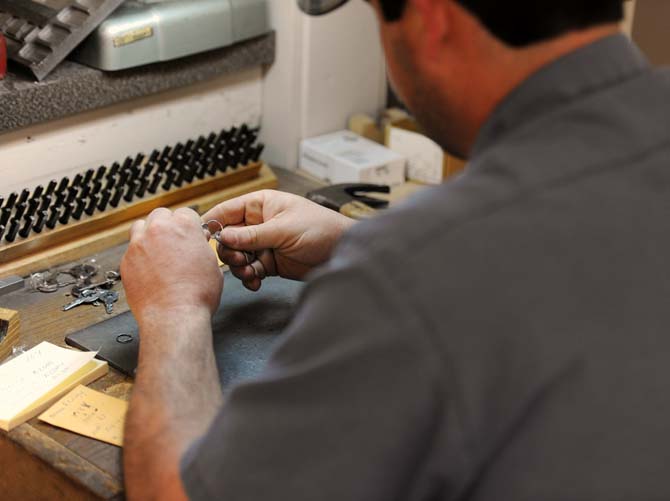In the wake of numerous school shootings and bomb threats, the University’s Facility Services department is taking steps to make the campus safer with a new procedure for issuing and keeping track of keys on campus.
Door by door, Facility Services workers will be making their ways around campus over the next few years in an effort to create a centralized electronic database that tracks the cutting and issuing of keys.
About two years ago, the issue of tracking and retrieving keys became a concern to the Associate Vice Chancellor of Human Resource Management A.G. Monaco, as well as LSU Chief of Police Lawrence Rabalais. They, together with Executive Director of Facility Services Tony Lombardo, decided the best way to improve safety for everyone on campus was to improve key control, according to Associate Director of Facility Maintenance Sam Territo.
“It’s more about security than it is about the keys,” Territo said.
With the old key system, Facility Services would cut and issue keys from its own lock shop based on work orders from various departments.
Once keys were cut, Facility Services issued keys to building coordinators, responsible for communicating with Facility Services about public safety and risk management concerns within their building. These building coordinators then issue keys to professors.
For more than a decade, building coordinators have been keeping track of each facility’s keys with a notebook, Territo said.
Territo said the informal tracking made it difficult to retrieve keys from professors leaving the University.
Not knowing how many people have keys to buildings around campus raised concerns for the LSU Police Department about the possibility of thefts on campus, Territo said.
Territo said not being able to track keys could lead to the wrong individuals having access to everything from dangerous materials like chemicals to musical instruments that could be pawned.
“There was no University tracking. It was all very decentralized and independently done,” Territo said. “Underlying everything is a terrorist act or a Virginia Tech-type scenario. For example, someone who has keys could enter a part of a building and basically barricade themselves in.”
Territo said the University is running an inexpensive pilot program for a new key system that allows Facility Services to track the keys in a central database as keys are cut and issued.
The Student Health Center was the first facility on campus to try the new procedure.
Territo said the pilot procedure was successful in the health center and allowed his department to learn more about the most efficient way to distribute and track keys.
A centralized database of the information allows Territo to print out the key records, determine who has which keys, and from that information, decide if certain key requests for a building should be fulfilled.
Along with Facility Service’s new key procedure, Residential Life has also taken steps toward improving dorm security by transitioning to Tiger Card building access for all dorms on campus, as well as a dorm room entry system that Territo called “hotel style” access with an ID feature.
Residents of newer residential halls like Blake, East and West Laville and the Residential Life colleges now use their Tiger Cards, combined with their own four-digit code, to get into their rooms.
“It’s about security, and with the students, they are taking the lead,” Territo said.
As Residential Life facilities continue to under go renovations, residential halls will be converted to the electronic locks, while Facility Services will continue to make its way around campus in the coming years to bring more buildings onto the new key system.
Currently, the Business Education Complex, Choppin Hall Annex and the Wetland Resources building are on the new key system, Territo said. The next buildings start using the system will be the parking garage and bookstore, the new Animal and Food Science Lab building and the Huey P. Long Fieldhouse.
“To the average person, they just need to get in,” Territo said. “But security is still separate in my mind.”
“Underlying everything is a terrorist act or a Virginia Tech type scenario.”






